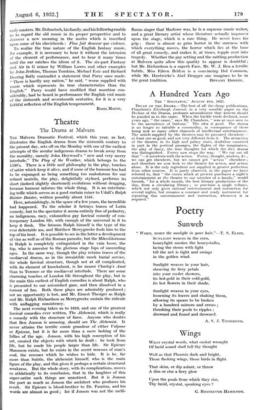Theatre
The Drama at Malvern
THE Malvern Dramatic Festival, which this year, as last, illustrates the English drama from the sixteenth century to the present day, sets off on the Monday with one of the earliest attempts of the secular indigenous drama to break away from the morality, namely John Heywood's "new and very merry interlude," The Play of the Weather, which belongs to the 1530's. There is a little naïf philosophy in the play, touches of satire which keep it alive, and if some of the humour has had to be expunged as being something too malodorous for our refined nostrils, the play, delightfully stylised, performs its short (indeed slightly shortened) evolutions without dragging, because humour informs the whole thing. It is an entertain- ing trifle which serves as a good curtain raiser to Udall's Ralph Roister Doister, written possibly about 1541.
Here, astonishingly, in the space of a few years, the incredible had happened. To the scholar it betrays traces of Latin comedy, but to the spectator it seems entirely free of pedantry, an indigenous, racy, exhaustless gay farcical comedy of con- temporary London life, with enough of the universal in it to keep it fresh. The fatuous Ralph himself is the type of the ever delectable ass, and Matthew Merrygreeke fools him to the top of his bent. It is possible to see in the latter a development of vice as well as of the Roman parasite, but the Miles Gloriosus in Ralph is completely extinguished in the vain lover, the fop, who is ancestor to the glorious stage fops of succeeding ages. In the same way, though the play retains traces of the mediaeval drama, as in the irresistible mock burial service, the whole farcical structure, though not at all complicated, with its element of knockabout, is far nearer Charley's Aunt than to Terence or the mediaeval interlude. There are some charming touches of London life throughout the play, but in the main this earliest of English comedies is about Ralph, who is presented to our astonished gaze, and then dissolved in a torrent of fun. Both these plays are admirably produced ; not an opportunity is lost, and Mr. Ernest Thesiger as Ralph and Mr. Ralph Richardson as Merrygreeke sustain the ridicule with unflagging consistency.
The next evening takes us to 1610, and one of the greatest farcical comedies ever written, The Alchemist, which is really a comedy with the structure of farce. Anyone who doubts that Ben Jonson is amusing, should see The Alchemist. It never attains the terrific comic grandeur of either Volpone or Epicene, but it is far more than a mere lashing of the follies of the age. Jonson, with his high conception of his art, created the objects with which he dealt ; he took from life, but he made his people larger than life. Sir Epicure Manunon exists, but he exists in the secret recesses of man's soul, the recesses which he wishes to hide. It is he, far more than Subtle, the alchemist himself, who is the main figure of the play, and this gives it perhaps a certain structural weakness. But the whole story, with its complications, moves so athletically to its conclusion, that in the laughter of this super-satire such things are unnoticed. But it is Jonson the poet as much as Jonson the architect who produces his result. Sir Epicure is blood-brother to Dr. Faustus, and his words are almost as good ; for if Jonson was not the mein-
fluous singer that Marlowe was, he is a supreme comic writer, and a great literary artist whose literature actually improves upon the stage, which is a rare thing. He never loses his grip ; there is almost as grim horror in the sureness with which everything moves, the horror which lies at the base of all great comedy, and makes it, at times, topple over into tragedy. Whether the gay setting and the rattling production at Malvern quite allow this quality to appear is doubtful ; but Mr. Richardson is a superb Face, Mr. W. J. Rea a terrific Subtle, Miss Eileen Beldon is a convincing Dol Common, while Mr. Hardwicke's Abel Drugger one imagines to be in


























 Previous page
Previous page